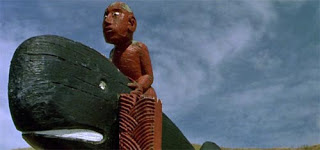The Whale Rider
The Film, Whale Rider begins to give us an understanding of the Maori culture. It is helpful to understand myths behind the culture to better analyze the film. the film is about a young girl, Paikea, whose twin brothers death happens at the time of her birth. Pakiea's brother's destiny was to become the new leader of the tribe to lead them out of darkness they were enduring. Throughout Paikea's childhood her presence is often disregarded by her grandfather, who had high hopes of the tribes new leader, who had to be a boy. Despite the death of the future leader, the grandfather searches within the tribe for a potential young man to lead. He pressures the boys and sets expectations that are too high by honoring old traditions from the Maori culture. Paikea ignores her grandfathers disapproval for her to lead, and secretly practices these traditions alone. Her grandfather continues to push her away, until it's too late. One day whales get beached and begin to die. The tribe tries everything in their power to save the whales but nothing seems to work. Paikea gets on top of the whales back, and the whale swims off into the sea, while the other whales follow. From the film, there is a strong understanding that Paikea dies that day. The grandfather finally realizes that Paikea has always been the leader. In the end the whole tribe realizes that it isn't about having just one leader, but coming
together to keep tradition alive.
About The Maori Culture:
The Maori came to New Zealand between the 9th and 13th centuries from the Hawaiian islands. Maori is derived from the term Ma-Uri or Children of Heaven. The Maori people are said to be fierce warriors. They believed in a world where gods controlled people's lives and could be found in nature. They believed that all things had some kind of life. Their traditions center around decorative artwork and used/use art to describe their beliefs. The Maori people believed in the super natural. The legendary Taniwha are called Tipua in Maori. They can take any form and exist in the natural environment. Sometimes they become guardians like the famed Taniwha. Those who believe in Taniwha understand the myth of the whale rider.
The Myth:
Ruatapu became offended when his father Uenuku elevated his older half-brother Kahutia-te-rangi (later known as Paikea) ahead of him. When Ruatapu was about to use a comb belonging to Kahutia-te-rangi, Uenuku became angered, pointing out that Kahutia-te-rangi was of high rank while Ruatapu was lower in status because his mother was a slave.
Angry and ashamed at his father's comments, Ruatapu built a canoe, or waka ( In Maori). When it was finished, he took Kahutia-te-rangi and a large number of the other high status sons of Uenuku, on his canoe and paddled far out into the sea to drown them. He had created a a hole in the bottom of the canoe, temporarily plugging it with his heel. When far out at sea, he removed his heel, and the canoe sank. Ruatapu then drowned each of the young men. However, Kahutia-te-rangi called to the gods calling upon Taniwha. A Humpback whale ( Paikea in Maori )rescued him and carried him to New Zealand's shores.
Kahutia-te-rangi renamed himself Paikea as a memorial of the assistance he received from the whales. The Maori now believe Paikea ( the famous whale rider ) is buried on the far side of the island. Paikea is now said to be fierce and highly regarded as a spiritual guardian.
http://sites.psu.edu/tetirclblog/2015/02/19/maori-mythology-and-the-legend-of-paikea/
http://whales.fieldmuseum.org/behind/people/maori-whale-riders
http://whaleriderreligiousstudies.weebly.com/maori-mythology.html



Wow, you're already doing some analysis of the use of myth in this movie. Mimi
ReplyDelete